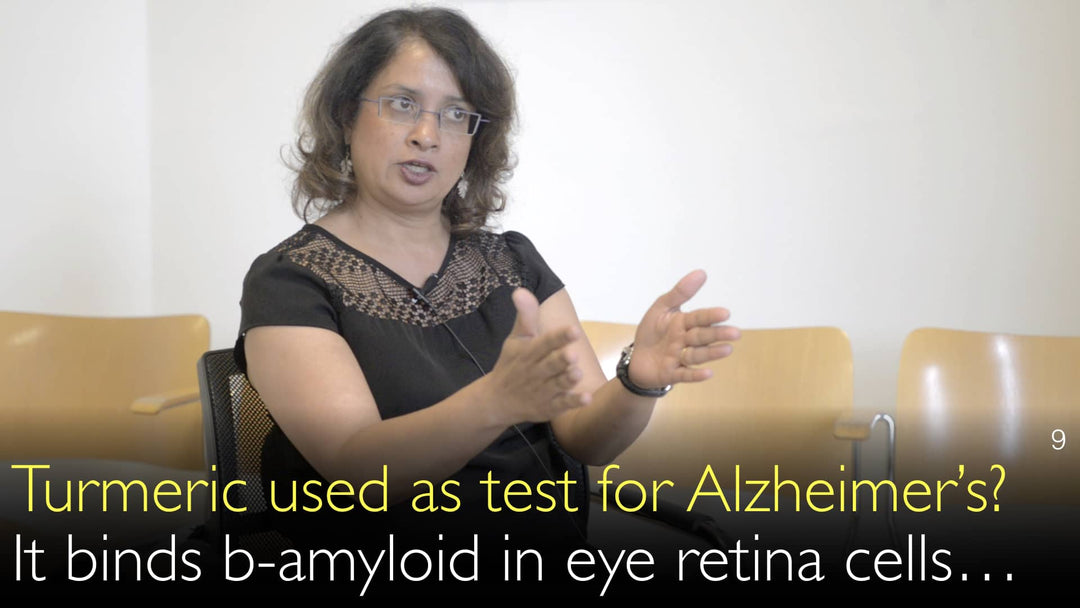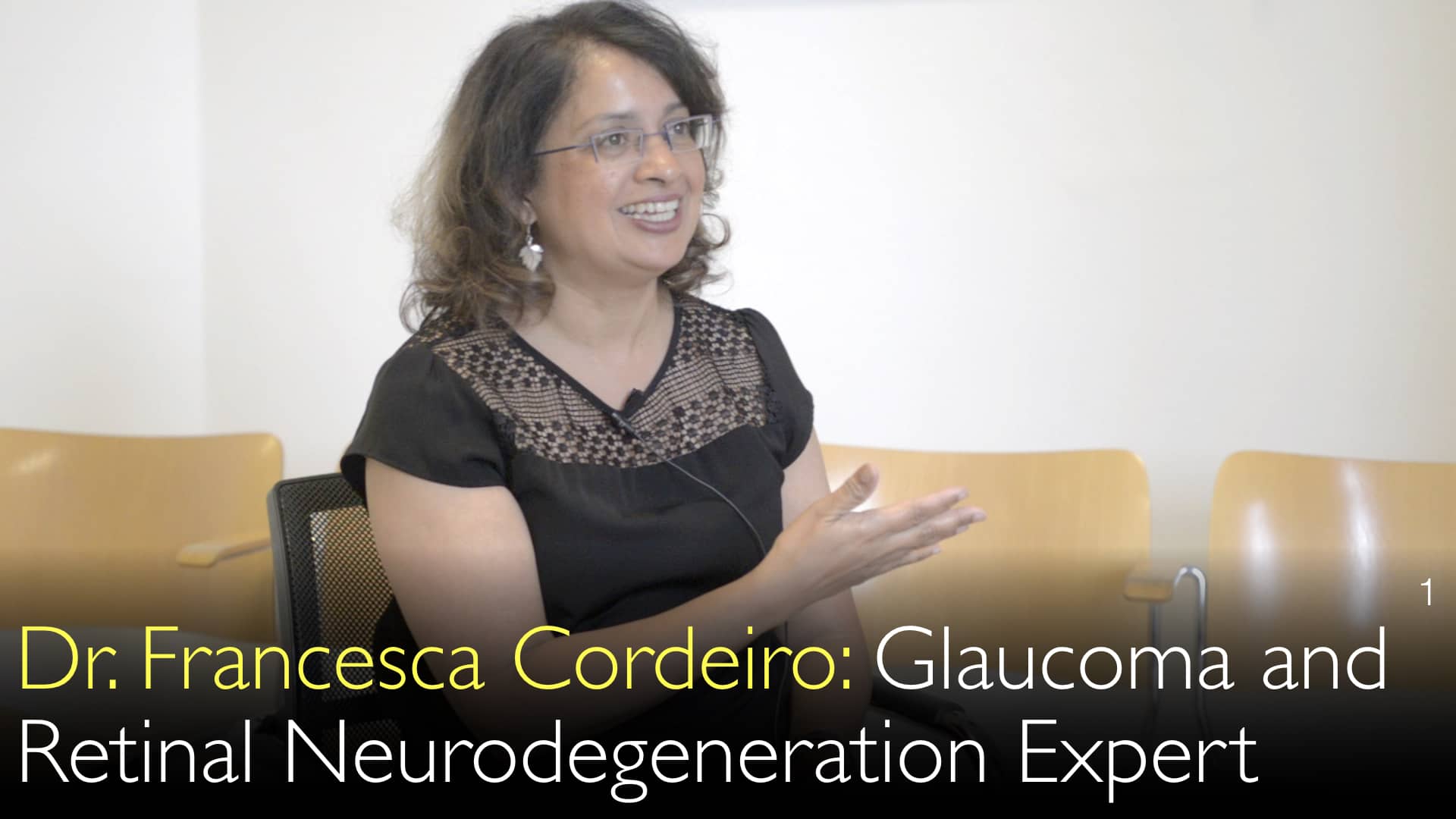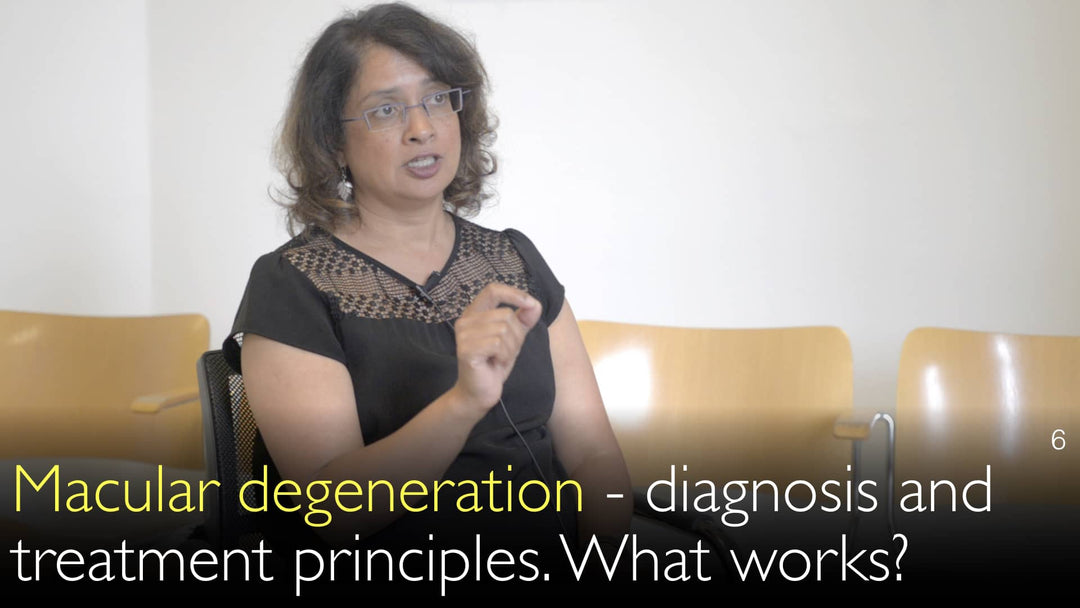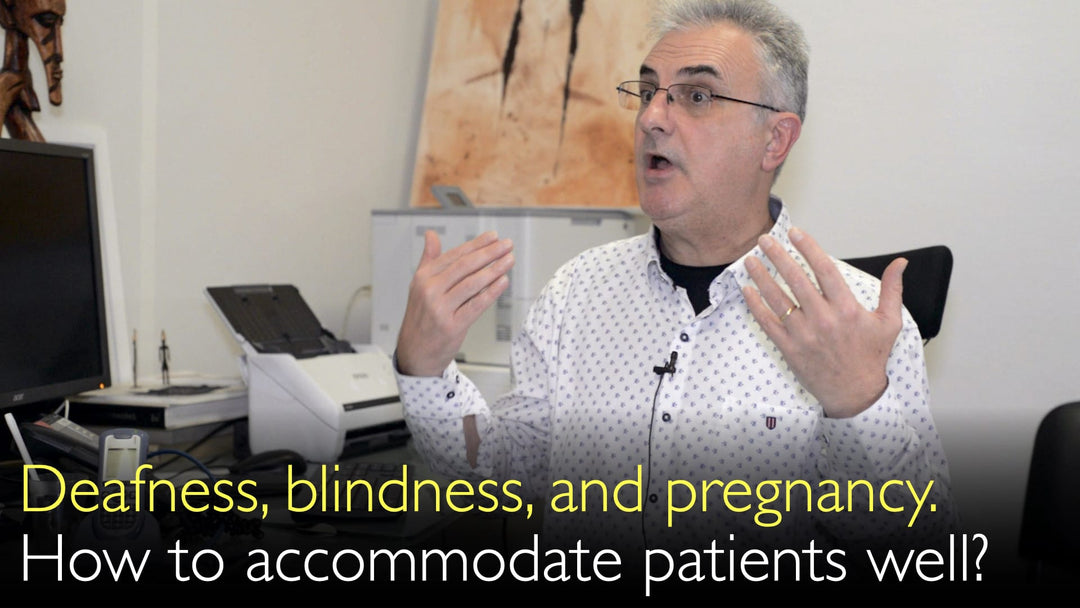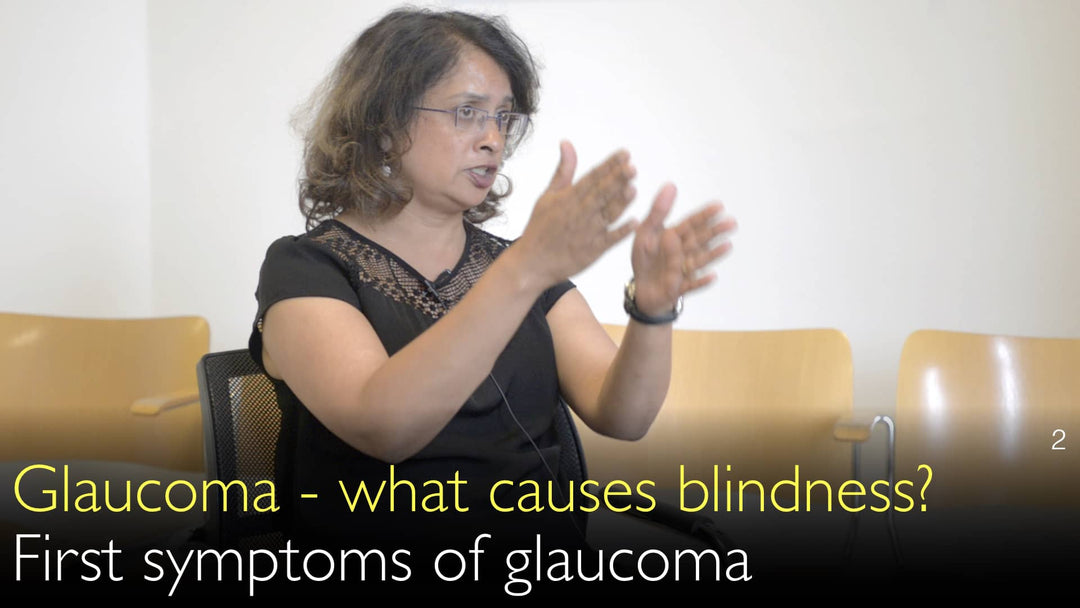Leading expert in neurodegenerative eye diseases, Dr. Francesca Cordeiro, MD, explains how a novel eye test called DARC (Detection of Apoptosing Retinal Cells) could revolutionize the early diagnosis of Alzheimer's disease. This non-invasive outpatient procedure uses a fluorescent curcumin-based eye drop to detect dying retinal nerve cells and beta-amyloid plaques, offering a potential window into brain pathology years before clinical symptoms appear. Dr. Cordeiro details its significance not only for identifying at-risk individuals but also for dramatically accelerating clinical trials by providing a rapid biomarker to measure treatment response in Alzheimer's and Parkinson's disease.
Early Alzheimer's Diagnosis: Revolutionary Eye Test Detects Neurodegeneration
Jump To Section
- The DARC Eye Test for Alzheimer's Disease
- The Retina-Brain Connection in Neurodegeneration
- How Curcumin Fluorescence Detects Amyloid
- Outpatient Diagnostic Procedure
- Accelerating Alzheimer's Clinical Trials
- Monitoring Treatment Response
- Applications in Parkinson's Disease
- Future Diagnostic Potential
The DARC Eye Test for Alzheimer's Disease
The DARC (Detection of Apoptosing Retinal Cells) test represents a breakthrough in preclinical Alzheimer's disease detection. Dr. Francesca Cordeiro, MD, explains that this innovative eye test identifies dying nerve cells, a process known as apoptosis, within the retina. This cell death is a key early event in neurodegeneration. The ability to detect these changes in the eye offers a critical window for intervention long before significant brain damage or clinical symptoms of Alzheimer's disease emerge.
The Retina-Brain Connection in Neurodegeneration
The retina is developmentally an extension of the brain, making it uniquely susceptible to the same neurodegenerative processes. Dr. Francesca Cordeiro, MD, notes that retinal nerve cells can begin dying years before nerve cell death is detectable in the brain itself. This early retinal apoptosis could signify the very onset of clinical Alzheimer's disease. Furthermore, patients with Alzheimer's disease show abnormal deposits of beta-amyloid protein in the retina, mirroring the pathological plaques found in the brain.
How Curcumin Fluorescence Detects Amyloid
The test utilizes a natural compound, curcumin, which is derived from the turmeric spice. Dr. Francesca Cordeiro, MD, describes the key mechanism: when curcumin binds to beta-amyloid protein, it fluoresces, or emits light. This fluorescence acts as a bright marker, allowing physicians to visually identify amyloid plaques deposited in the retina during a standard eye scan. This provides a direct, observable sign of the Alzheimer's disease pathology occurring at a cellular level.
Outpatient Diagnostic Procedure
A major advantage of this diagnostic approach is its practicality for widespread use. Dr. Francesca Cordeiro, MD, explains that the test is designed to be performed as a simple outpatient procedure. Instead of an injection, her team developed a curcumin-based eye drop. A physician can administer the drop and then use existing scanning equipment commonly found at ophthalmology and optometry clinics to detect the fluorescence, making this a highly accessible and non-invasive test for patients.
Accelerating Alzheimer's Clinical Trials
One of the most significant applications for this technology is in pharmaceutical research. Dr. Francesca Cordeiro, MD, highlights a major problem in Alzheimer's disease: clinical trials take an extremely long time to determine if a new medication works because changes in the brain are very subtle and slow. This eye test can compress that timeframe by providing a rapid biomarker. By measuring the level of retinal cell apoptosis, researchers can get an early indication of whether a therapy is effectively slowing neurodegeneration.
Monitoring Treatment Response
This test can also transform how treatment success is measured in individual patients. Dr. Cordeiro suggests establishing a baseline level of apoptotic activity—perhaps 20 to 30 dying retinal cells—when a patient is first diagnosed. After starting an effective treatment, the number of these fluorescent spots indicating cell death should decline. This decrease serves as a clear, early indicator that the Alzheimer's disease therapy is working, well before improvements might be seen in cognitive tests or brain scans.
Applications in Parkinson's Disease
The utility of this diagnostic test extends beyond Alzheimer's disease. Dr. Francesca Cordeiro, MD, notes that her team has published results using the DARC technology in experimental models of Parkinson's disease. They demonstrated that successful treatment causes the level of retinal apoptosis to decrease well before changes are observed in the brain's substantia nigra, the area primarily affected by Parkinson's. This confirms the test's role as a sensitive and early indicator of treatment response across neurodegenerative conditions.
Future Diagnostic Potential
While the potential is enormous, Dr. Francesca Cordeiro, MD, emphasizes that these findings must be properly assessed in large-scale population clinical trials. The goal is to validate the test's ability to identify patients at higher risk for Alzheimer's disease and to reliably monitor therapeutic outcomes. As Dr. Anton Titov, MD, discusses with Dr. Francesca Cordeiro, MD, this technology could revolutionize neurodegenerative disease diagnosis and treatment, offering hope for earlier intervention and better management of these challenging conditions.
Full Transcript
Alzheimer’s disease preclinical detection is key to early treatment approaches. The new eye test is DARC: Detection of Apoptosing Retinal Cells finds dying nerve cells in the eye retina. The eye develops from the brain, and the retina is affected by neurodegeneration. Curcumin (turmeric) fluoresces when it binds beta amyloid. Amyloid deposits in the retina and brain in Alzheimer’s disease.
Retinal nerve cells could be dying in the eye for many years.
Dr. Anton Titov, MD: It happens before nerve cells start dying in the brain. This could signify an onset of clinical Alzheimer's disease.
Dr. Francesca Cordeiro, MD: Yes, absolutely, that is the hypothesis. But there is other research that has been going on as well. We are looking into this too. Sometimes you can look for beta amyloid in plaques being deposited in the retina. You do see that in transgenic Alzheimer models, which are experimental mouse models.
Glaucoma and Alzheimer’s disease both affect the retina. Patients do have beta amyloid abnormally deposited in the retina. You can observe beta amyloid in the retina with some fluorescent markers. We know turmeric binds beta amyloid. Turmeric is the orange spice used a lot in curries. When turmeric binds beta amyloid protein, it fluoresces. So in the retina, you can pick up the fluorescence. It is a marker of beta amyloid protein being deposited in the retina.
There is more data that suggests the meaning of these retinal changes. It could highlight death of neurons in the retina before they may even happen in the brain. But these findings need to be properly assessed in large-scale population clinical trials. Potentially, this eye test for Alzheimer’s disease could be an outpatient test.
Dr. Anton Titov, MD: You can do this diagnostic test with equipment that exists at ophthalmologists and optometrists. You just inject the dye under proper conditions.
Dr. Francesca Cordeiro, MD: We developed an eye drop. So a physician is able to do this in an outpatient clinic. Using the eye drops and a standard scan can potentially identify patients who are at higher risk for Alzheimer’s disease.
Dr. Anton Titov, MD: This can select patients with Alzheimer’s disease for early treatment. Yes. But perhaps another, more imaginable early benefit of this would be using this "Alzheimer's eye test" to assess response to treatment of Alzheimer’s disease. It is very difficult in Alzheimer's disease treatment to know how a patient is responding to therapy.
A potential test to diagnose a preclinical stage of Alzheimer's disease is looking at how cells die in the retina. That is the test undergoing clinical investigations now. But one of the biggest problems in Alzheimer's disease clinical trials is that it takes a long time to determine whether a medication candidate works or not, because of the very subtle changes in Alzheimer’s disease.
The test that you developed can potentially revolutionize the diagnosis of Alzheimer’s disease. It can also compress the time frame of clinical trials for Alzheimer’s disease therapy.
Dr. Anton Titov, MD: Could you please talk about the significance of your test for Alzheimer’s disease?
Dr. Francesca Cordeiro, MD: This diagnostic test is not just for clinical practice, as we just discussed, but also for medication clinical trials in Alzheimer's disease. Yes. We have published test results in a Parkinson's disease model as well.
What we are suggesting is that you can use the level of apoptosis—where you see these fluorescent spots in the retina—as a measure of Parkinson’s disease activity. If you successfully treat your patient, then this Parkinson’s disease activity should go down. The number of cells with apoptosis in the retina should go down.
We have shown this in a number of eye disease models. The experimental model for Parkinson's eye disease definitely has suggested this. You can use this as an indicator of whether your Parkinson’s disease treatment is successful. You see treatment results much earlier than you can see changes in the brain.
In this particular study with the Parkinson's model, we show that retinal apoptosis went down well before brain changes. There were changes that had been reversed in the brain regarding substantia nigra, the brain area affected in Parkinson’s disease.
Dr. Anton Titov, MD: That is important because this retinal diagnostic test is relatively non-invasive. It's easy to do, as you've seen yourself. This eye diagnostic test can be done in an outpatient department. It means you can use this diagnostic test as a way of determining response to Parkinson’s disease treatment.
In all these diseases, we suggest starting with a baseline level of activity. So you see some number of cells.
Dr. Francesca Cordeiro, MD: We are talking about 20, maybe 30 retinal cells with apoptosis. These retinal cells are dying, which is a sign of neurodegeneration. You get your patient with Alzheimer’s disease on a good treatment. If therapy works well, maybe the number of dying cells in the retina will go down.
We don't know the absolute numbers at the moment. We are expecting the number of retinal cells that show signs of apoptosis to be much higher when you look all the way around the eye. But the importance of the diagnostic test for Alzheimer’s disease is just a decline in the number of these dying retinal cells. It will be a good enough indicator that you have your patient on the correct treatment.


